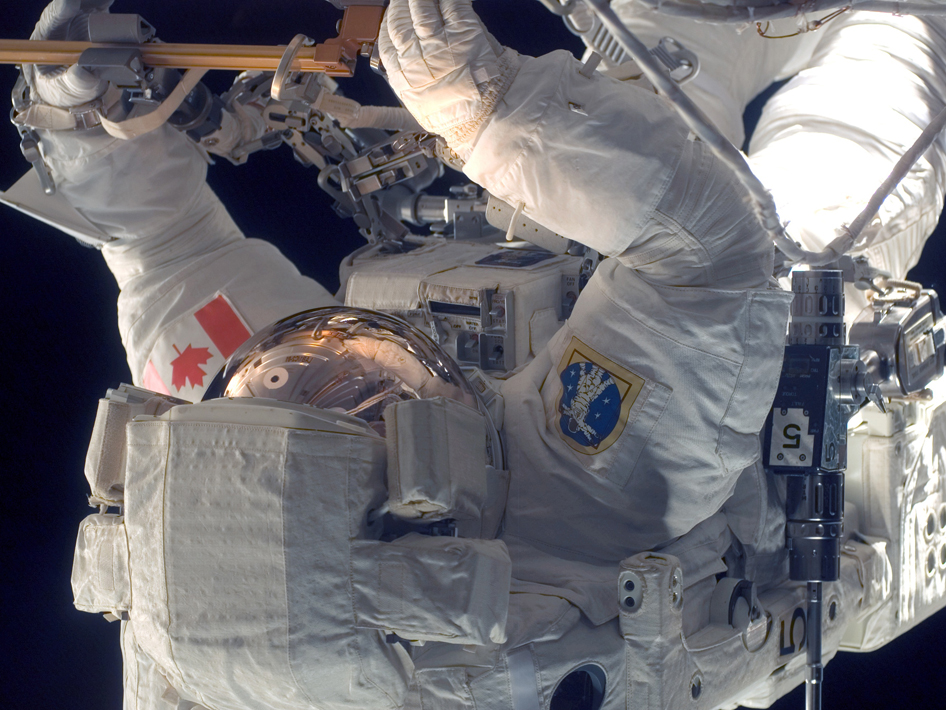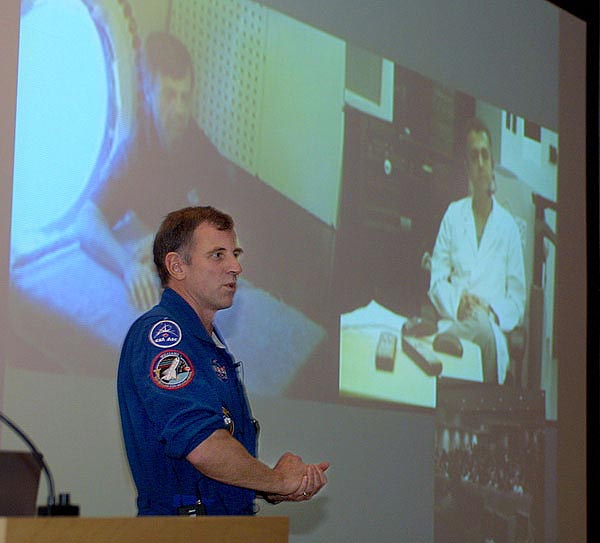
News
Astronaut Dave Williams tells Canadian kids to look to the stars
 "I was riding on the end of the Canadian arm, with the Canadian flag on my shoulder,'' he said. It filled him with pride to see the Maple Leaf on the shuttle's boom, the shuttle's arm and on the spaceship itself.
"I was riding on the end of the Canadian arm, with the Canadian flag on my shoulder,'' he said. It filled him with pride to see the Maple Leaf on the shuttle's boom, the shuttle's arm and on the spaceship itself.
March 3, 2008 By By Nelson Wyatt
 Before astronaut Dave Williams retired his space suit Saturday, he had one piece of advice for Canada's youngsters: Never, ever, give up on your dreams.
Before astronaut Dave Williams retired his space suit Saturday, he had one piece of advice for Canada's youngsters: Never, ever, give up on your dreams.
"I was seven years old when I dreamed of becoming an astronaut and I never thought it was going to be possible,'' he said in a recent interview.
Now, the 53-year-old has retired from active duty with two space shuttle missions under his belt and the record for longest spacewalks by a Canadian.
"Somewhere out there in Canada right now could be the next generation of astronaut that could be participating in missions to the moon,'' he said from Houston, Texas. "Somewhere out there in Canada right now there might be a seven year old that might be participating in those first missions to Mars.''
Jim Prentice, federal minister responsible for the Canadian Space
Agency, which announced Williams's retirement, says his
accomplishments in the past decade helped position Canada as a
space-faring nation.
Williams inspired "young people across our country to take their
place as members of Canada's next space generation,'' Prentice said
in a statement.
Williams was selected as an astronaut in 1992.
His first mission was in 1998 aboard Columbia. He spent 16 days
on experiments focusing on the effect of weightlessness on the
brain. He acted as scientist and subject in 26 experiments.
Williams completed his second space flight as a mission
specialist in August 2007 to assist in construction of the
International Space Station.
The Saskatoon-born doctor spent a total of 28 days, 15 hours in
space during his missions.
It's not hard for him to recall his best moment in space. That
was during his last flight.
 "I was riding on the end of the Canadian arm, with the Canadian flag on my shoulder,'' he said. It filled him with pride to see the Maple Leaf on the shuttle's boom, the shuttle's arm and on the
"I was riding on the end of the Canadian arm, with the Canadian flag on my shoulder,'' he said. It filled him with pride to see the Maple Leaf on the shuttle's boom, the shuttle's arm and on the
spaceship itself.
"We've got great technology with robotic arms that we've developed for the shuttle and the station and we wouldn't be able to fly the shuttle if it weren't for that contribution.''
Williams departure comes as NASA enters the final phase of the shuttle program. NASA plans about a dozen more flights, with the final mission due in 2010.
As honoured as he is to have been part of the program, he acknowledged the "magnitude of the commitment''
and time away from family for training and missions was tough.
"It was a great opportunity,'' he said. "My family was very,
very supportive and I just really enjoyed being able to fly. But in
many cases, when we're out in space _ wouldn't it be great to be
able to share this experience with our families firsthand.''
They did get to see the launches and landings, he says. And all
the photographs.
But his wife, an Air Canada pilot, and his two children, were
never far from his thoughts. He took his wife's first officer's
wings on his first space flight and her captain's wings on his
second. A recording of his daughter playing "It's A Wonderful
World'' on the piano also made that trip.
And Williams knows how wonderful a world it is. He remembers well
gazing out the window of the spacecraft within moments of being in
space the first time and looking earthward.
"I remember how spectacular the view was and the tremendous
beauty of the Earth,'' he said. "You, of course, get a chance to
look down on the brilliant blue colour of the ocean with the clouds
sparkling over it. It's absolutely spectacular.''
Other things start to stand out the longer you're in space, such
as how relatively small the planet is, noted Williams, who also
worked for NASA as director of the space and sciences directorate.
"You see the effects that the human species is having on the
planet and you can see pollution and things. You come away with a
sense of what you might call 'planetary stewardship' and how
important it is to protect the planet for the future.''
Williams said he thinks it's an exciting time for the space
program. He'd love to see a Canadian on the moon.
He believes the Canadian Space Agency is on track and says Canada
should continue to look forward in its national priorities in space
exploration and build on its technological contributions in
satellite technology and robotics.
A move to Oakville, Ont., which is closer to the airport for his
wife, is next on the family's agenda. She's been commuting from
Toronto to Houston, where the family lives, for the last 13 years.
"Sometimes in the media you see these contests about who has the
worst commute,'' Williams said with a chuckle. “I would say that
travelling from Houston to Toronto to go to work certainly qualifies
for a lengthy commute.''
The avid sportsman is not sure what he'll do next and is looking
at his options.
"It's been a great career of participating in the astronaut
program,'' Williams said. "Now I think it's time to transition to
the next phase.''
Williams said he hadn't considered following in the footsteps of
another former astronaut, Marc Garneau, and entering politics.
"I think there's a lot of challenges doing that,'' Williams
said.
THE CANADIAN PRESS